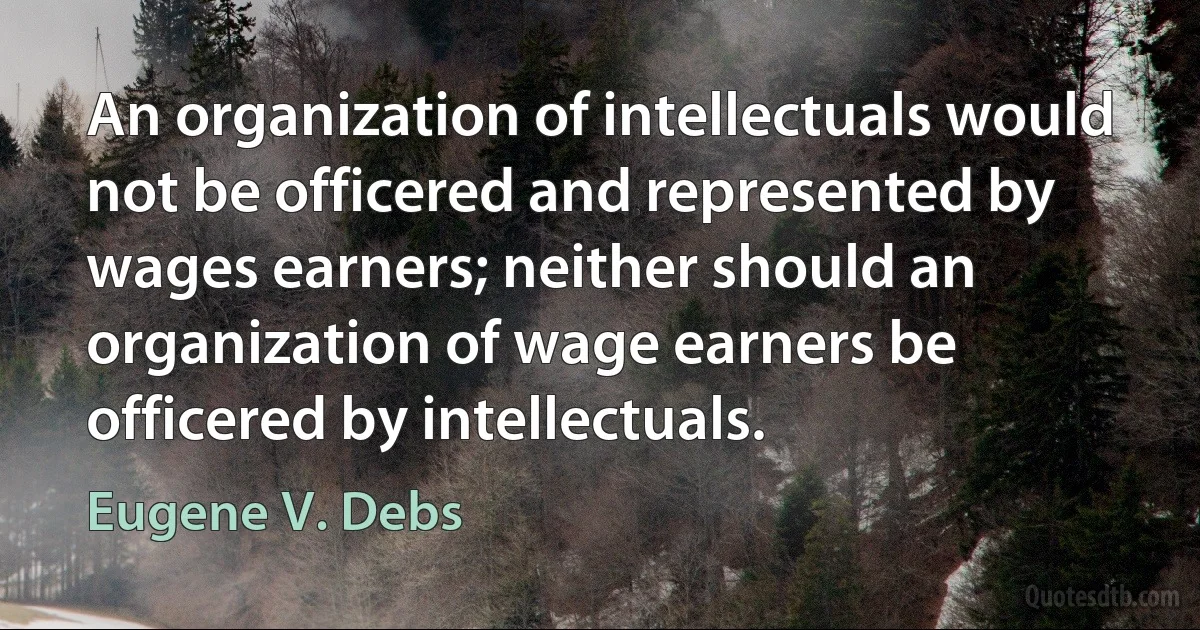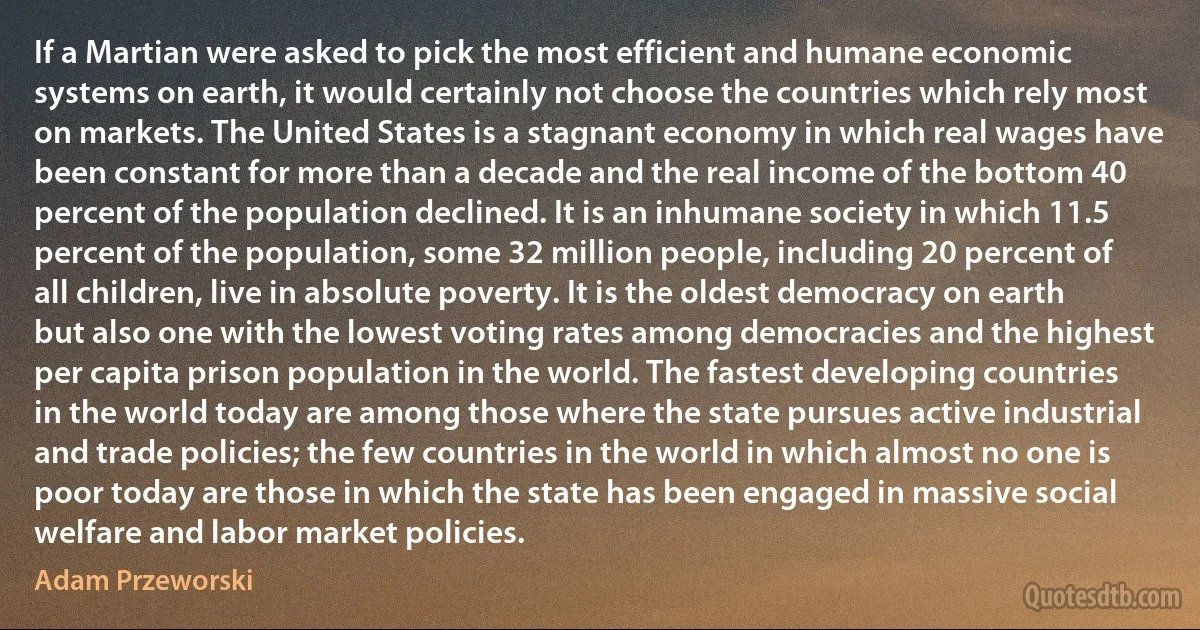Wages Quotes - page 6
Now the employer is to be told that if the unions force him to pay exorbitant wages or go out of business if he tries to continue, he will be taxed. The unions will escape any punishment. The employer will not be allowed to increase employment by paying lower wages nor to attract good labour by paying higher wages. We shall have another huge department to supervise the whole operation...an incomes policy is minted in the thinking of 1945.

Jo Grimond
... there is nothing that the most prominent men in the Liberal party more earnestly desire than that labour representation, direct labour representation, shall be as large as possible... It is sometimes said to me, "Oh! but you are against State intervention in matters of great social reform". At this time of the day it would be absurd for any man who has mastered all the Mining Regulations Acts, the Factories Acts, the great mass of regulation which affects trade; it would be absurd for any man to stand on a platform and say he was entirely against State intervention. I, for my part, have never taken that position... My own belief is that in the matters of hours and of wages for adult male labour the interference would be a bad and mischievous thing... that in such matters, for example, as housing of the poor and so forth, the proper machinery through which to carry out these operations is municipal and not Parliamentary.

John Morley, 1st Viscount Morley of Blackburn
As we have said, the bankers are for bullets-for the fool patriots that enlist at paupers' wages to stop the bullets, while the bankers clip coupons, boost food prices, increase dividends, and pile up millions and billions for themselves. Say, Mr. Workingman, suppose you have sense enough to be as patriotic as the banker, but not a bit more so. When you see the bankers on the firing line with guns in their hands ready to stop bullets as well as start them, then it is time enough for you to be seized with the patriotic itch and have yourself shot into a crazy-quilt for their profit and glory. Don't you take a fit and rush to the front until you see them there. They own the country and if they don't set the example of fighting for it, why should you?

Eugene V. Debs
In this world, as in our own, nearly all the chief means of production, nearly all the land, mines, factories, railways, ships, were controlled for private profit by a small minority of the population. These privileged individuals were able to force the masses to work for them on pain of starvation. The tragic farce inherent in such a system was already approaching. The owners directed the energy of the workers increasingly toward the production of more means of production rather than to the fulfilment of the needs of individual life. For machinery might bring profit to the owners; bread would not. With the increasing competition of machine with machine, profits declined, and therefore wages, and therefore effective demand for goods. Marketless products were destroyed, though bellies were unfed and backs unclad. Unemployment, disorder, and stern repression increased as the economic system disintegrated. A familiar story!

Olaf Stapledon
We are already well down the road toward a managed-trade regime. It would be far better to acknowledge that reality, and seek a set of reasonable rules, than to pretend that Ricardian trade is the norm and allow mercantilist states to overwhelm U. S. industry and ratchet down wages, in the name of free trade.

Robert Kuttner
San Domingo, with a stable government, under which her immense resources can be developed, will give remunerative wages to tens of thousands of laborers not now upon the island. This labor will take advantage of every available means of transportation to abandon the adjacent islands and seek the blessings of freedom and its sequence-each inhabitant receiving the reward of his own labor. Porto Rico and Cuba will have to abolish slavery, as a measure of self-preservation, to retain their laborers.

Ulysses S. Grant
These, in the day when heaven was falling,
The hour when earth's foundations fled,
Followed their mercenary calling
And took their wages and are dead.
Their shoulders held the sky suspended;
They stood, and earth's foundations stay;
What God abandoned, these defended,
And saved the sum of things for pay.

A. E. Housman
I have... instituted systematic, voluntary measures of cooperation with the business institutions and with State and municipal authorities to make certain that fundamental businesses of the country shall continue as usual, that wages and therefore consuming power shall not be reduced, and that a special effort shall be made to expand construction work in order to assist in equalizing other deficits in employment... I am convinced that through these measures we have reestablished confidence. Wages should remain stable. A very large degree of industrial unemployment and suffering which would otherwise have occurred has been prevented. Agricultural prices have reflected the returning confidence. The measures taken must be vigorously pursued until normal conditions are restored.

Herbert Hoover
It is impossible to read the works of the economists who since the time of Smith have endeavored to build up and elucidate the science of political economy without seeing how, over and over again, they stumble over the law of wages without once recognizing it. Yet, "if it were a dog it would bite them!" Indeed, it is difficult to resist the impression that some of them really saw this law of wages, but, fearful of the practical conclusions to which it would lead, preferred to ignore and cover it up, rather than use it as the key to problems which without it are so perplexing. A great truth to an age which has rejected and trampled on it, is not a word of peace, but a sword!

Henry George
Open borders? [...] That's a right-wing proposal, which says essentially there is no United States. [...] It would make everybody in America poorer. You're doing away with the concept of a nation state, and I don't think there's any country in the world that believes in that. If you believe in a country called the United States or any other country, you have an obligation to do everything we can to help poor people. What right-wing people in this country would love is an open-border policy. Bring in all kinds of people, work for $2 or $3 an hour, that would be great for them. I don't believe in that. I think we have to raise wages in this country, I think we have to do everything we can to create millions of jobs.

Bernie Sanders
What we have seen is that while the average person is working longer hours for lower wages, we have seen a huge increase in income and wealth inequality, which is now reaching obscene levels. This is a rigged economy, which works for the rich and the powerful, and is not working for ordinary Americans ... You know, this country just does not belong to a handful of billionaires.

Bernie Sanders
It is gratifying to report that the progress of industry, the enormous increase in individual productivity through labor-saving devices, and the high rate of wages have all combined to furnish our people in general with such an abundance not only of the necessaries but of the conveniences of life that we are by a natural evolution solving our problems of economic and social justice.

Calvin Coolidge
There is ample work for all in this country provided all will work. The problem of unemployment is aggravated, not wholly by the alien knocking at our gate, but by the laborer at home slamming the door of production behind him and walking out. Stopping industry will not right the matter. And in the last analysis it is the earnings of industry, which on the average are only fair, that provide alike for wages and the increase of investment on which is the sole dependence of the advance of civilization.

Calvin Coolidge
I set up our labour union in 1935, because we - the popular musicians - had never had one. It was somehow a huge movement, but because of the lack of experience of some people, discussions and divisions started between us. However, I can recall everyone showed combativeness and we've got better wages, weekly rest and the end of workday at 4PM.

Osvaldo Pugliese



